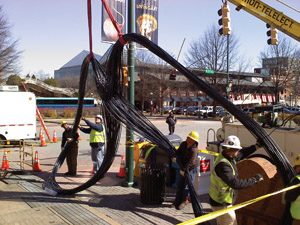Next Century Cities Launch Webcast on October 20
Municipalities are increasingly realizing they need to take steps to ensure fast, affordable, reliable Internet access for local citizens. Some are doing the work themselves with publicly owned projects while others seek public-private partnerships. In order to capitalize on collaboration, a group of city leaders are now forming Next Century Cities.
On October 20, 2014, they will webcast the official launch from Santa Monica at 9:30 a.m. - 1 p.m. PT / 12:30 p.m. - 4 p.m. ET. From the announcement:
We're proud to announce the official launch of Next Century Cities. Next Century Cities is a new, city-to-city collaboration that supports community leaders across the country as they seek to ensure that all have access to fast, affordable, and reliable Internet. Founding Partners represent dozens of cities from across the United States.
On October 20, we will be officially launching at Cross Campus in Santa Monica, CA. Our event will bring together mayors from communities across the country, as well as successful technologists who have helped to implement and run some of the nation's most impressive broadband networks. We're proud to host mayors and leaders from across the country for a series of thought-provoking discussions about how high-quality broadband Internet has begun to empower American communities.
Featured speakers will include
- Mayor Pam O'Connor, Santa Monica, California
- Mayor Andy Berke, Chattanooga, Tennessee
- Mayor Joey Durel, Lafayette, Louisiana
As part of the event, Susan Crawford will moderate a panel discussion with Mayors and city leaders from a variety of communities.
The event will also include a panel discussion moderated by Christopher Mitchell with information and innovation leaders from the cities of Santa Monica, Boston, Kansas City, Portland, Raleigh, and Lafayette.










 The desire to focus on long term investments rather than rapidly evolving services is a natural reaction given the historic role of local governments in long term infrastructure investments. Fiber certainly fits in that description and as many have noted, the comparison to roads is apt.
The desire to focus on long term investments rather than rapidly evolving services is a natural reaction given the historic role of local governments in long term infrastructure investments. Fiber certainly fits in that description and as many have noted, the comparison to roads is apt.